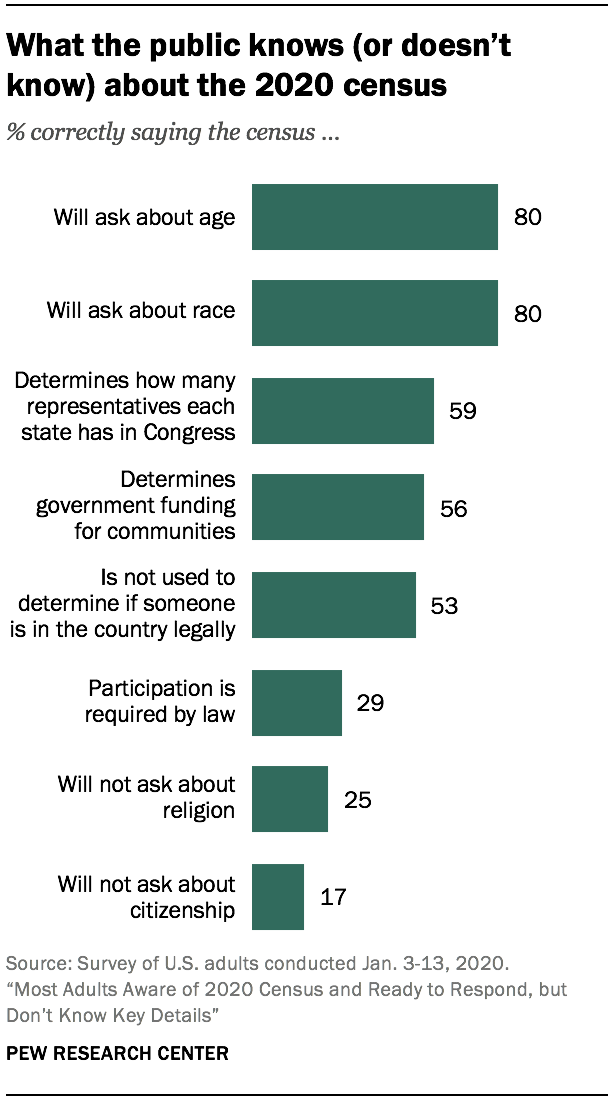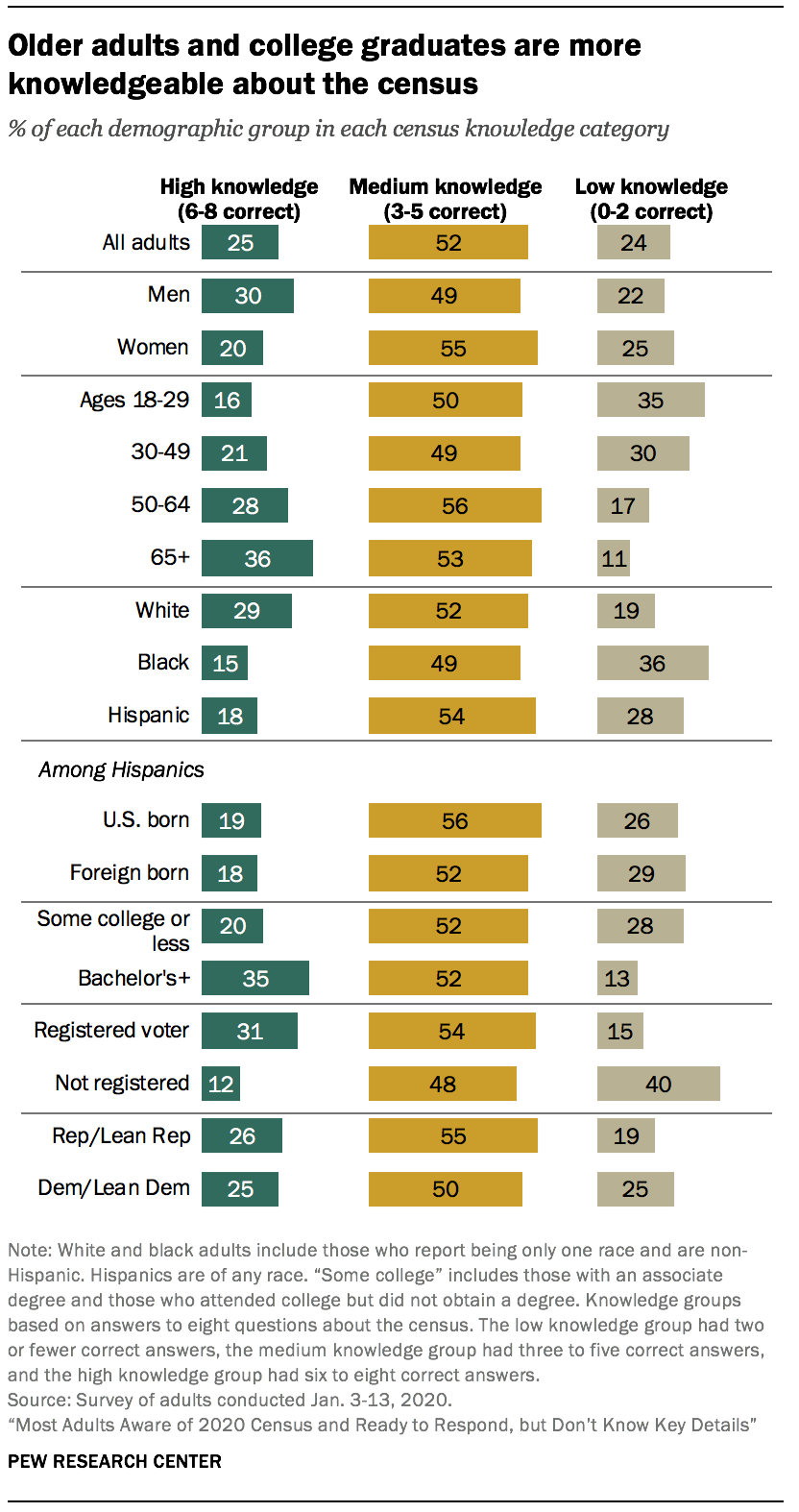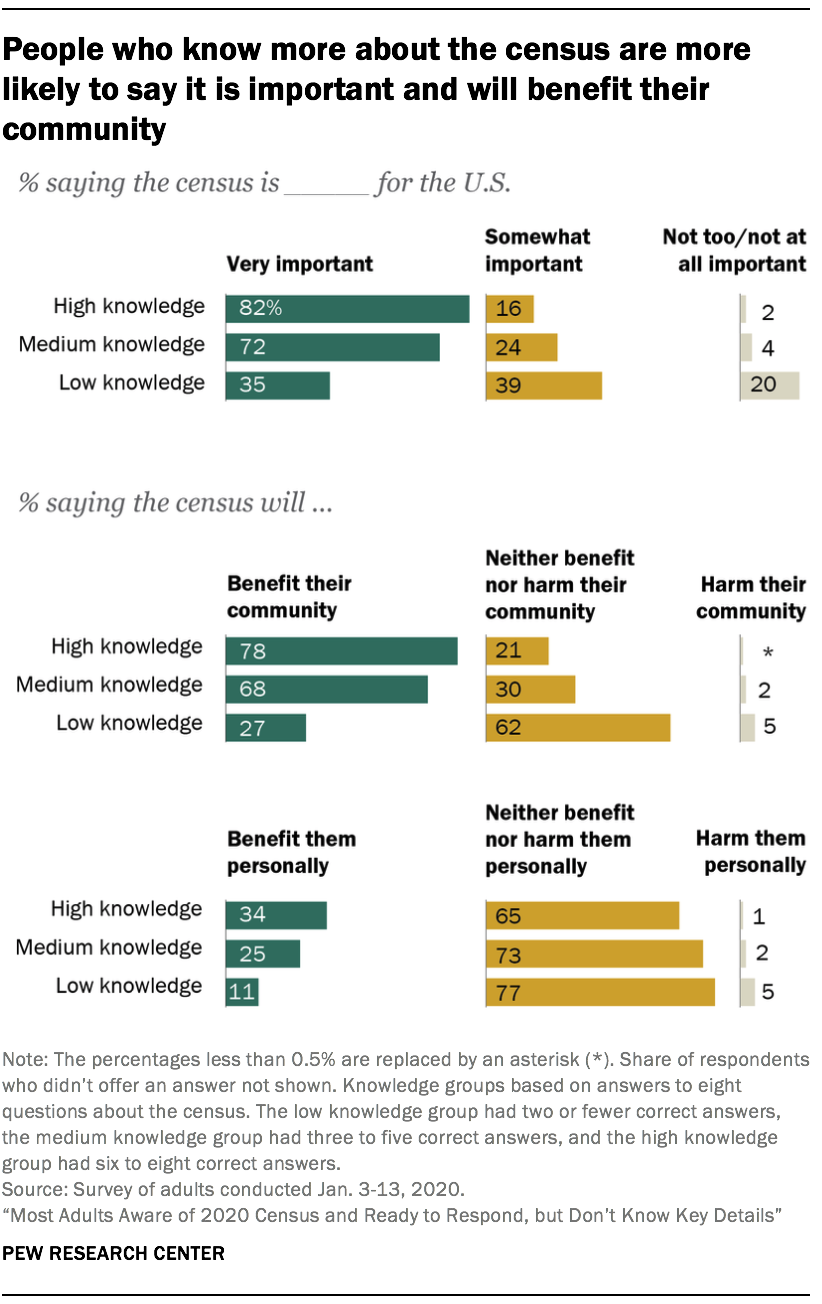
While awareness of the U.S. census is nearly universal, much of the public is hazy about important details such as whether participation is required by law and what specifically will be asked on the census form. This lack of familiarity is not new; the public in early 2010 had a similar level of knowledge of many of these facts.
In the current survey, just 29% know that participation in the census is required by law. A larger number (37%) erroneously believe that it is not required, while a third are unsure. Ten years ago, a similar small minority knew that participation is required.
The survey shows that much of the public knows basic facts about how census data will or will not be used. A majority (59%) correctly say that the census is used to decide how many representatives each state will have in Congress, and nearly as many (56%) say that the census is used to decide how much money communities will get from the government. Just over half (53%) are aware that the census is not used to determine whether someone is in this country legally; 14% erroneously believe that it is used for this purpose. Knowledge of how census data is used is roughly similar to what it was in January 2010, when Pew Research Center asked these questions of the public in a telephone survey.3
Large majorities of the public in the current survey know that the census will collect information about age and race (80% each). But most people are unaware that citizenship and religious affiliation will not be asked about. A majority (56%) believe – incorrectly – that citizenship will be asked about, and just 17% are aware it will not be on the form. Only a quarter could correctly state that questions about religion are not asked.
The survey also asked about a new feature of the census – the fact that people will be able to fill out their census form online. Just 22% of respondents correctly say that there will be an option to complete the census online. While only 6% incorrectly believe there will be no online option, 71% say they are unsure.
Older and more educated adults know more about the census

The survey included eight questions in total that measured knowledge of various aspects of the census.4 Respondents were divided into three groups based on their answers to those eight questions. About one-quarter (24%) correctly answered two or fewer questions (low knowledge group). About half of respondents (52%) answered between three and five of the questions correctly (medium knowledge). And one-fourth (25%) correctly answered six or more of the eight items (high knowledge).
Knowledge about the census tends to be strongly associated with age and education. Older or more highly educated respondents are considerably more knowledgeable than younger or less educated ones. For example, 36% of respondents ages 65 and older are in the high knowledge group, compared with just 16% among those under 30. A similar knowledge gap is seen between college graduates (35% in the high knowledge group) and those without a college degree (20% in the high knowledge group).
The differences were even more stark on certain questions: For example, 76% of college graduates but only 52% of those without a four-year college degree correctly state that the census is used to determine the size of each state’s congressional delegation. And 76% of those 65 and older know this, compared with just half among those under 30. This is not surprising, since older people have experienced more rounds of the decennial census, and more formal education likely exposes individuals to information about the census and how it is used.
But even the oldest or most highly educated respondents struggled with certain questions. Only 26% of college graduates are aware that there will be no citizenship question on the census form, a higher share than among those without a four-year degree (13%) but far from a majority. Only 21% of those 65 and older could state that there would not be a citizenship question on the census; 16% of those under 30 know this. Similarly, just a third of college graduates (33%) could correctly state that answering the census is required by law, only slightly higher than the 28% of those without a college degree who say this. But older respondents are considerably more likely than younger ones to be aware of the legal requirement to answer the census. Among those 65 and older, 46% correctly answered this question, while just 21% of those under 30 and just 22% of those ages 30 to 49 could do so.
One question for which age and education made little difference was awareness of the option to complete the census online. Fewer than 30% of respondents across all major demographic groups were aware of the online response option.
Greater knowledge of the census is linked to more positive views of its potential impact

People who know more about the census have more favorable attitudes about it. Knowledgeable individuals are more likely to believe that participating in the census is very important and that participation will benefit their community. Knowledge is also related to perceptions that taking part in the census will benefit the individual who participates, but not as strongly as believing that it will benefit the community. These attitudes, in turn, are strongly related to one’s intention to participate in the census.
The biggest differences in attitudes tend to occur between the low and medium knowledge respondents. Among those with low knowledge about the census, just 35% say the census is very important for the United States. Among those with medium knowledge, 72% say the census is very important, while 82% of those in the highest knowledge group say this. Similarly, just 27% of those in the low knowledge group believe that participating in the census would benefit their community, while 68% of the medium knowledge group and 78% of the high knowledge group believe this.
More knowledgeable individuals are more likely than others to say that participating in the census will benefit them personally, but even among those in the highest knowledge group, just 34% say this. In the lowest knowledge group, just 11% see a personal benefit in census participation.
Given the link between opinions about the census and knowledge of what is on it and how its data is used, it is not surprising that knowledge about the census is associated with willingness to participate. People who are more familiar with the census and what will be asked on it are significantly more likely to say they definitely will participate. Among those in the lowest knowledge group, just 21% say they will definitely participate in the decennial count and another 22% say they probably will do so. The likelihood of participation jumps substantially among the medium knowledge group, with 58% saying they definitely will participate and 28% saying they probably will. Fully 82% of those in the high knowledge group say they definitely will complete their census form, and another 12% will probably do so.
The strong association between knowledge and intention to participate is not simply a function of demographic differences between low and high knowledge individuals. Even taking the demographic differences into account, knowledge has a strong and independent association with likelihood of participating.